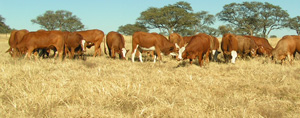
Agricultural marketing and trade standards tested

The Agro-Marketing and Trade Agency (AMTA) organised a two weeks theory and practical training for its Agronomic Standards Officers, Market Research Officers, Silo Control Officers and Food Safety Officers.
The Perishable Products for Export Control Board (PPECB) South Africa is conducting the training as a result of a Service Level Agreement that was signed by the fresh produce trade agency and the control board in October.
The training started from, 26 October and expected on the 5 November in Aussenkehr, Karas Region.
During this grape season AMTA Inspectors will work hand in hand with Perishable Products for Export Control Board as part of capacity building across all grape farm and pack houses in order to leverage from the experience of the Perishable Products for Export Control Board inspectors who have extensive knowledge and skills of more than 20 years in the grape industry.
The inspection services for the 2015/2016 grape season is expected to last for at least 10 weeks or beyond.
During the past financial year, AMTA established the department of Standards and Trade to facilitate the implementation of agricultural marketing and trade and promote industrialisation as well as promote, facilitate and enforce standards compliance of agricultural products.
The Department assists in the inspection of facilities and farms for standard compliance when handling fresh produce at the pack houses or farms. The department also tests samples of produce for laboratory analysis to determine the contents of chemicals found in the products in terms of Maximum Residual Level (MRL) rules to ensure food safety.
The Senior Manager of Standards and Trade Mr Fidelis Nyambe Mwazi said that the objective of the training is to enhance the knowledge and skills of the officers who will form part of inspections during the 2015/2016 grape season at pack houses and farms.
The officers will supervise and monitor the Maximum Residual Level (MRL) sampling process and cold chain monitoring, Mwazi said. “The reason for such services are to conduct mandatory conformance inspection at all pack houses; supervise and monitor the MRL sampling to establish the official Maximum Residual Level database that enforces compliance of food safety standards before the products are exported,” he further explained.
The conformity inspections and Maximum Residual Level monitoring sampling are ongoing services nationally at all registered facilities (Silos, retailers, millers and other food business operators) and farms where other crops are produced.
Moreover, Mr Warren Farmer, the Regional Manager for Perishable Products for Export Control Board Northern Cape, South Africa who spoke on behalf of the Control Board said that it is important to control the exports of perishable products while at the same time enhancing the brand of Namibian fresh produce in the international market.
“The training process forms a critical part, as the foundation for competency and to ensure uniform application of standards”, he said. Adding that the Perishable Products for Export Control Board is fully dedicated to provide a professional service and to assist creating capacity to the AMTA officers.
He highlighted that “this project will only be successful through commitment from all parties involved, effective communication and collaboration between all relevant stakeholders”.
In addition to aiding marketing, the Standards and Trade Department also manages Border Control import and export of all agronomic and horticultural products as well as executing of the Horticultural Market Share Promotion (MSP) initiatives.
The MSP target is to increase local production of fresh produce for import substitution and currently in the second quarter of 2015 (July, August September) traders bought 57% of their total sales from the local producers at National Level.
“AMTA is rendering several services to the traders and producers to ensure that we keep local horticultural production moving from land to nation,” said Mwazi.











































